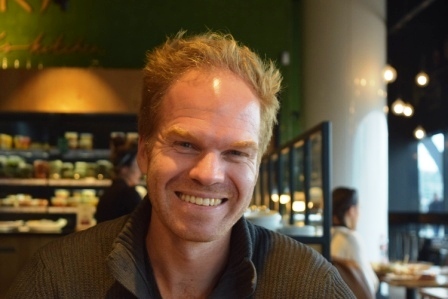Sometimes a film will inspire me so much I will take a train to another country--staying with a friend for the night--just to have a conversation with the director for a couple hours in the station.
Such was the case with Tom Fassaert's A Family Affair, a Dutch film I saw screen at the Thessaloniki Documentary Film festival last spring. It is the kind of documentary I love: a journey structured like a fiction film using genre techniques, in this case, the suspense plot, rhythm and energy of a detective flick.
The story hit close to home: a young man--the director himself--is puzzled why his father has suffered such depression all his life, and why his uncle, his father's brother, shows such psychological pain as well and has spent his life in and out of mental health shelters. He guesses--from his father's bitter accounts of his childhood--that it had something to do with the fact that his grandmother abandoned her sons for a few years when they were small.
Why did she do that?
Immediately the film has at its center a fascinating anti-hero: this mysterious aloof 95-year-old grandmother who now lives in South Africa and who was once, we learn, a famous fashion model. The director goes off to Africa to discover why this woman was so cruelly unmaternal as to abandon her children--and remained uncaring when she eventually took them back. All he knows, from his own childhood visits with her, is that she was the charismatic energetic lady in whose company his father cowered.
Plot twist after plot twist reveal who this alluring beauteous cold hearted woman is. It turns out that the trauma of the two abandoned brothers can be traced back not only to her, but to people in the woman's past---and to other countries, including Nazi Germany. Family history and political history combine at the climax in a breathtaking crescendo of "truths".
What I most liked in the film is the compassion of the director towards his subject. In piecing together the story of his family past, he mediates between his father's hurt towards his mother, and his own affable affection for her. We see him acting alternately like a "Dad" comforting his hurt father, and like a "kind companion" to his ruthlessly egocentric live-wire grandmother, pleasantly biding with her self-indulgence.
The highlight: when the director responds with equanimity to his grandmother's shocking confession of a taboo sexual desire.
I went to Amsterdam on the five pm train to discuss.
The tall blonde thirty-something Dutchman greeted me with a great warm smile and bright blue eyes, and treated me to a fresh fruit juice and delicious carrot soup in an upscale organic foods café in the station.
"Could I please ask what inspired your project?"
"This is my grandmother's story," the documentarist said.
His eyes lit up. "For both my sister and I, when we were children, our grandmother was this bigger than life character. So elegant, charismatic, unusual, full of style." He laughed. "Her vitality was extraordinary. Imagine, she had an enormous sex drive at age ninety-five!"
And yet this same woman had destroyed his father, by leaving him, at age three, in an orphanage.
The director nodded.
"My father never fully recovered from that trauma. Emotionally, I made this film for him. He felt abandoned all his life. Yes, it left scars. An obsessive longing for women. She was cold to him even as an adult, but he would keep trying to go back to her, to reach her. It was very painful for him."
I imagined that the director, as the son, was also very affected by his father's wounds. Children often, I opined, experience the emotions of their parents and internalize them--not even knowing that they are doing so.
"Yes. I felt my father's sadness as a kid. When I started making my film I did not know that I was dealing with something deeper inside myself, this very deep sadness in myself that I could not define. Some emotions you have are not even your own; you inherit them. They are connected with the traumas of one's parents and their parents. They are an emotional undercurrent--very intimate."
I confided that the transmission of trauma through generations is a topic of particular interest to me. In the novel I was currently finishing, The Drowning, two women become friends, not aware that the traumas they carry inside them--from other generations--will explode and wreck evil around them.
"It's a form of healing, to tell the story," I said. "Was telling the story of your grandmother a form of healing for you as well?"
"Yes," the director nodded. "It was a way to bring the family together again."
He noted with great joy that he completed his film at the same time that he learned he was to be a new father.
He smiled : "Two wonderful things at once!"
Indeed the film was, in a way, a preparation for the new generation.
"I think because of the film I became very conscious what it means to have children and the risks also, and the way in which relationships define and influence lives, and the way the things you don't cope with, you give to the next generations. I feel a sense of responsibility. Finishing the film gave me more insights into what made me what I am, this darker side. I feel at ease with becoming a parent."
The film A Family Affair is now playing in New York City and Los Angeles. Fassaert's next film will be about his uncle.

